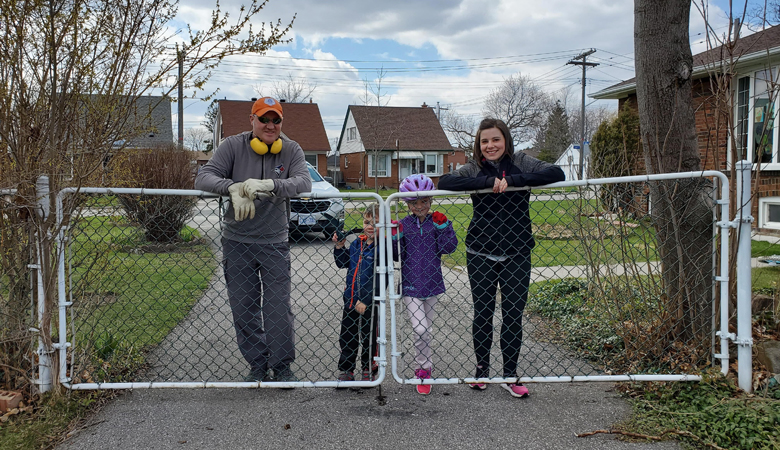(Above) Cpts Laura and Stefan Van Schaick and their children, Vanessa and Shawn, during an impromptu physically distanced visit with a friend in April
“Stay home, stay safe.” My children quote this slogan by Canada’s chief public health officer, Dr. Theresa Tam, like any other commercial jingle. Their home is a safe space and they have no reason to question this truth. While they are missing their friends, their isolation experience has been a positive one, as has mine.
“Stay home, stay safe.” My children quote this slogan by Canada’s chief public health officer, Dr. Theresa Tam, like any other commercial jingle. Their home is a safe space and they have no reason to question this truth. While they are missing their friends, their isolation experience has been a positive one, as has mine.
Porch photos, popular in the early days of the pandemic, portrayed households as safe havens in a world of COVID-19. And for many they are. For the most part, it’s been smooth sailing through the pandemic storm for me and my family. In fact, many aspects of this experience have been wonderful and full of familial bliss.
I can work from home with a flexible schedule. I am educated, speak English and have access to a computer, so I can home-school my children with ease. I have a husband who is likewise available to assist around the house. We have craft supplies, board games and a large yard to keep ourselves occupied. We’ve bought bags of flour and sugar and put our cooking skills to the test—and I’ve gained 10 pounds in the process! And while I know of people who have contracted COVID-19, and even some who have died, no one in my family has contracted the disease. I am incredibly privileged.
I am painfully aware that this has not been everyone’s reality. I’ve heard it said that while we may all be facing the same storm, many are riding this out in vastly different boats—our homes. For some, those homes are not safe spaces.
The United Nations Population Fund suggests that three months of quarantine will result in a 20 percent rise in intimate partner violence, resulting in at least 15 million cases of domestic violence worldwide, with most victims being women. Children are at risk as well. World Vision is reporting a 42 percent spike in physical, sexual and emotional violence against children in areas where they serve. And if you think this is only a concern in other parts of the world, think again. Many municipal jurisdictions in Canada are already reporting spikes in reports of family violence.
Some families are struggling more than others with juggling childcare, lineups at grocery stores, work and home-schooling due to single parent arrangements, job loss or other added stressors. In these homes there isn’t time or energy for family bonding over board games and baking cookies. Instead, home has become a place of stress rather than a place of refuge.
Food bank usage has increased since the pandemic started as families whose children relied on school feeding programs are now experiencing hunger. For them, bare cupboards at home are a stark reminder of their financial need.
Other homes are just too crowded to be safe. The outbreak at the Cargill meatpacking plant in Alberta stemmed primarily from a lack of physical distancing, not only in the workplace, but also in the home, where multiple immigrant families live together in a single dwelling. This problem is magnified in countries such as India and Haiti, where many people live in slum housing where quarantine and isolation are nearly impossible.
For others, home is a lonesome place. This is especially true for those in longterm care facilities where residents have faced mental-health challenges and chronic isolation due to the pandemic. Virus outbreaks at care homes have also put a spotlight on deficiencies in funding and support for the elderly that originated long before the pandemic erupted.
And what of those without a home? How do you isolate when you live in a shelter, couch surf or sleep on the street?
Stay home and stay safe, if you can, but remember that not everyone is in as privileged a position. And they may never be, pandemic or not. That’s something we could all be a bit more mindful of.
I’m thankful to be a part of The Salvation Army, which addresses these concerns head-on and reaches out helping hands to provide practical assistance and hope to those who may not count themselves among the privileged. Let’s all do our part to prayerfully consider how we can help bridge the gap between privilege and disadvantage as we pray, “God, may your kingdom come.”
Captain Laura Van Schaick is the women’s ministries program and resource officer.
I can work from home with a flexible schedule. I am educated, speak English and have access to a computer, so I can home-school my children with ease. I have a husband who is likewise available to assist around the house. We have craft supplies, board games and a large yard to keep ourselves occupied. We’ve bought bags of flour and sugar and put our cooking skills to the test—and I’ve gained 10 pounds in the process! And while I know of people who have contracted COVID-19, and even some who have died, no one in my family has contracted the disease. I am incredibly privileged.
I am painfully aware that this has not been everyone’s reality. I’ve heard it said that while we may all be facing the same storm, many are riding this out in vastly different boats—our homes. For some, those homes are not safe spaces.
The United Nations Population Fund suggests that three months of quarantine will result in a 20 percent rise in intimate partner violence, resulting in at least 15 million cases of domestic violence worldwide, with most victims being women. Children are at risk as well. World Vision is reporting a 42 percent spike in physical, sexual and emotional violence against children in areas where they serve. And if you think this is only a concern in other parts of the world, think again. Many municipal jurisdictions in Canada are already reporting spikes in reports of family violence.
Some families are struggling more than others with juggling childcare, lineups at grocery stores, work and home-schooling due to single parent arrangements, job loss or other added stressors. In these homes there isn’t time or energy for family bonding over board games and baking cookies. Instead, home has become a place of stress rather than a place of refuge.
Food bank usage has increased since the pandemic started as families whose children relied on school feeding programs are now experiencing hunger. For them, bare cupboards at home are a stark reminder of their financial need.
Other homes are just too crowded to be safe. The outbreak at the Cargill meatpacking plant in Alberta stemmed primarily from a lack of physical distancing, not only in the workplace, but also in the home, where multiple immigrant families live together in a single dwelling. This problem is magnified in countries such as India and Haiti, where many people live in slum housing where quarantine and isolation are nearly impossible.
For others, home is a lonesome place. This is especially true for those in longterm care facilities where residents have faced mental-health challenges and chronic isolation due to the pandemic. Virus outbreaks at care homes have also put a spotlight on deficiencies in funding and support for the elderly that originated long before the pandemic erupted.
And what of those without a home? How do you isolate when you live in a shelter, couch surf or sleep on the street?
Stay home and stay safe, if you can, but remember that not everyone is in as privileged a position. And they may never be, pandemic or not. That’s something we could all be a bit more mindful of.
I’m thankful to be a part of The Salvation Army, which addresses these concerns head-on and reaches out helping hands to provide practical assistance and hope to those who may not count themselves among the privileged. Let’s all do our part to prayerfully consider how we can help bridge the gap between privilege and disadvantage as we pray, “God, may your kingdom come.”
Captain Laura Van Schaick is the women’s ministries program and resource officer.










Leave a Comment